Food-related bloating is not only uncomfortable but can affect even the fittest physique. “The most common cause of stomach pain and bloating is excess intestinal gas,” says the Cleveland Clinic. “If you get a bloated stomach after eating, it may be a digestive issue. It might be as simple as eating too much too fast, or you could have a food intolerance or other condition that causes gas and digestive contents to build up.” here are 15 foods that can cause bloating or encourage belly fat.
Sugar Alcohols

Sugar alcohols such as can cause bloating and discomfort. “Avoid sugar alcohols (which end in -ol) such as sorbitol, mannitol, xylitol and erythritol," Jacqueline Wolf, MD, tells CNBC. "They cause gas and often bloating because we cannot break them down. Stevia and monk fruit extract are healthier and less likely to cause gas or bloating."
Carbonated Beverages

Want a flat stomach? Avoid carbonated beverages. “Think about what happens if you shake a can of soda,” Beth Czerwony, RD, tells the Cleveland Clinic. “That’s what is happening inside of you after you drink it. The bubbles have no place to go — and it will make you feel bloated.”
Beans and Lentils

“Though beans and lentils are excellent sources of protein and fiber, these foods also contain complex sugars called oligosaccharides, which cause bloating and gas as they pass through the digestive system,” Christine Q. Nguyen, D.O., tells the Mayo Clinic. “To reduce the amount of sugar, always rinse canned beans and ensure they are thoroughly cooked. Cooking beans until they are very soft helps to decrease gas production.”
RELATED: 15 Daily Habits to Lose 5-10 Pounds in 30 Days
Junk Food
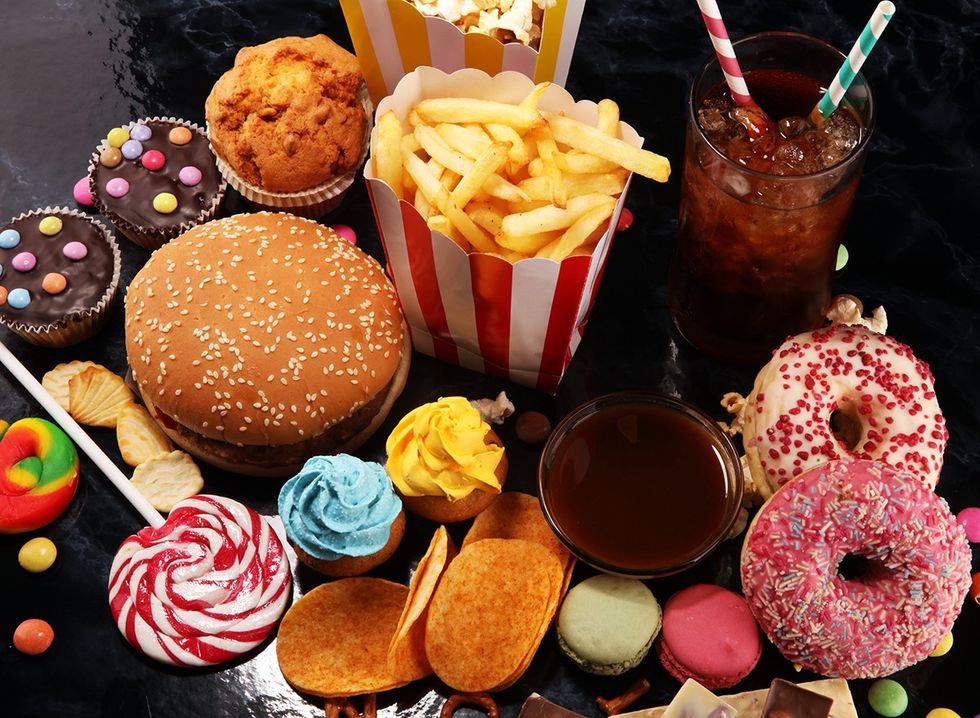
The high sodium in junk food may cause water retention and bloating. “Eating meals that are high in sodium, high in fat or heavy with refined carbohydrates (such as bread, buns or breading) can all leave you feeling bloated,” says the Cleveland Clinic. “And, if you add a soda to your meal, the carbonation could make it worse.”
Sorbitol

Sorbitol is a natural sugar that can cause bloating and discomfort. “Sorbitol is a sugar found naturally in fruits, including apples, pears, peaches, and prunes,” says the IFFGD. “It is also used as an artificial sweetener in many dietetic foods and sugar-free candies and gums.”
Sugar-Free Gum

Gum can cause bloating even aside from the sugar alcohol issue. “The gas and bloating you experience when chewing sugar-free gum is not uncommon,” Alicia Romano, MS, RD, LDN, says via Tufts Health & Nutrition Letter. For one thing, we naturally swallow a lot of air while chewing gum—sugar-free or not. Extra air swallowed can mean extra gas.”
Dairy Products

“Lactose intolerance affects 68% of the population and becomes even more common as we age,” Dr. Wolf tells CNBC. “Unsweetened yogurt is tolerated by most people, as most of the lactose is broken down. And hard or aged cheeses (parmesan, brie, mozzarella, Swiss and goat cheese) are more likely to be tolerated than soft cheeses.”
RELATED: 20 Things to Avoid While on Ozempic
Apples

Apples may cause bloating for some people. “Aside from their health benefits, this fruit has been known to cause bloating and other digestive issues in some people,” says PIH Health. “Cooked apples may be easier to digest than fresh ones if you experience this problem.”
High-Starch Foods

Potatoes and corn can cause gassiness and bloat. “Most starches, including potatoes, corn, noodles, and wheat, produce gas as they are broken down in the large intestine,” says the IFFGD. “Rice is the only starch that does not cause gas.”
Onions and Garlic

Onions and garlic contain fructan, a naturally occurring carbohydrate that can be hard to digest. “To reduce sensitivity, cook the vegetables well or soak in water for at least 15 minutes if eating them raw,” Dr. Nguyen tells the Mayo Clinic. “You may also consider using powdered versions — although some people may still have sensitivity.”
RELATED: 15 Quick Ways to Lose Body Fat Percentage in a Week
Beer

They call it a beer belly for a reason! “Bloating can be caused from the carbonation in beer being released or the gut reacting with the sugars or yeast in wine or other fermented drinks,” Young Henrys Head Distiller Carla Daunton tells HuffPost. “Distillation removes this from the equation.”
Too Much Fiber

“While fiber-rich foods are highly beneficial, too much fiber can cause unpleasant side effects and negatively impact health,” Victoria Whittington, RDN, tells Signos. “Consuming excessive fiber without adequate fluid intake can lead to bloating, gas, and abdominal discomfort.”
Cruciferous Vegetables

Cruciferous vegetables are notorious for causing stomach issues. “Broccoli, cauliflower, brussels sprouts and cabbage are among the most challenging to digest due to their complex fibers, which tend to ferment in the gut, causing gas and bloating,” Dr. Nguyen tells the Mayo Clinic. “Alternative nutrient-rich foods that are easier on the gut include dark leafy greens like kale, spinach and Swiss chard.”
RELATED: This Is Exactly How to Lose Body Fat This Year
Kimchi and Sauerkraut

There’s no doubt fermented foods are good for gut health, but some people are sensitive to them. “Fermented foods can strengthen your gut microbiome. But some may cause temporary bloating and gas,” Dr. Wolf tells CNBC. “I recommend limiting your intake of kimchi, kombucha and sauerkraut for a more comfortable stomach.”
Gluten

If you have a gluten intolerance, wheat might make you bloat. “There’s no cure for gluten intolerance,” says the Cleveland Clinic. “But most people find relief from symptoms by following a gluten-free diet. You should work with your healthcare provider and a dietitian to plan your diet.” And if you enjoyed this article, don't miss 20 Incredible Ozempic Success Stories of All Time.








 1. Hydrate the Right WayShutterstock
1. Hydrate the Right WayShutterstock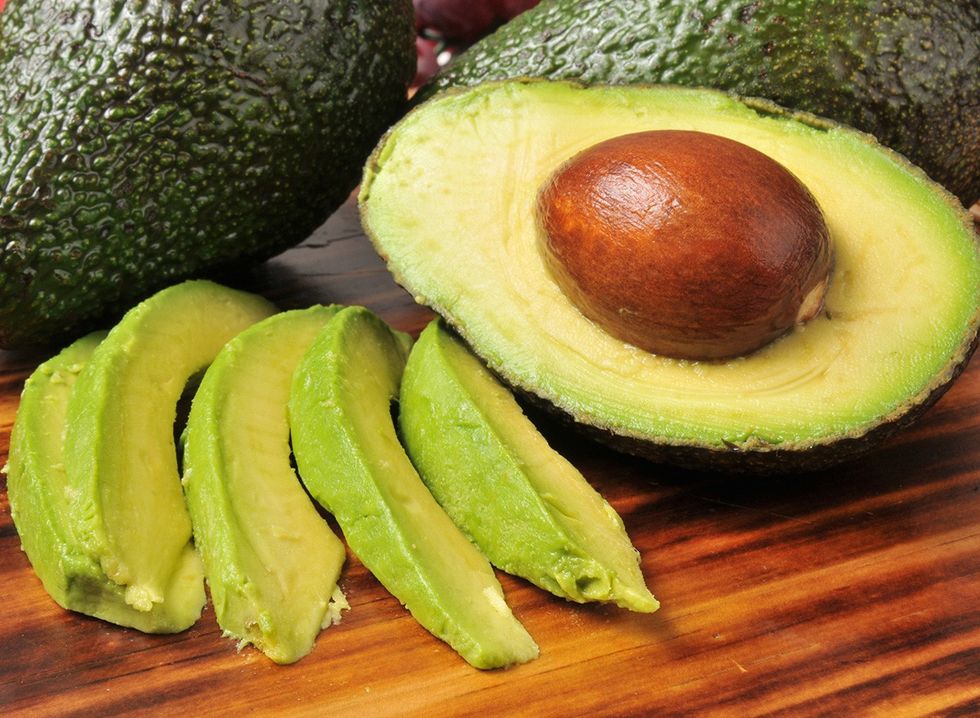 AvocadoShutterstock
AvocadoShutterstock Leafy GreensShutterstock
Leafy GreensShutterstock EggsShutterstock
EggsShutterstock Spice Up Your Food with Healthy CondimentsShutterstock
Spice Up Your Food with Healthy CondimentsShutterstock Shutterstock
Shutterstock Shutterstock
Shutterstock Nuts and SeedsShutterstock
Nuts and SeedsShutterstock Regular YogurtShutterstock
Regular YogurtShutterstock Kevin’s Natural Foods Cilantro Lime ChickenShutterstock
Kevin’s Natural Foods Cilantro Lime ChickenShutterstock Amp Up Your Protein IntakeShutterstock
Amp Up Your Protein IntakeShutterstock Shutterstock
Shutterstock Prebiotic Foods: OatsShutterstock
Prebiotic Foods: OatsShutterstock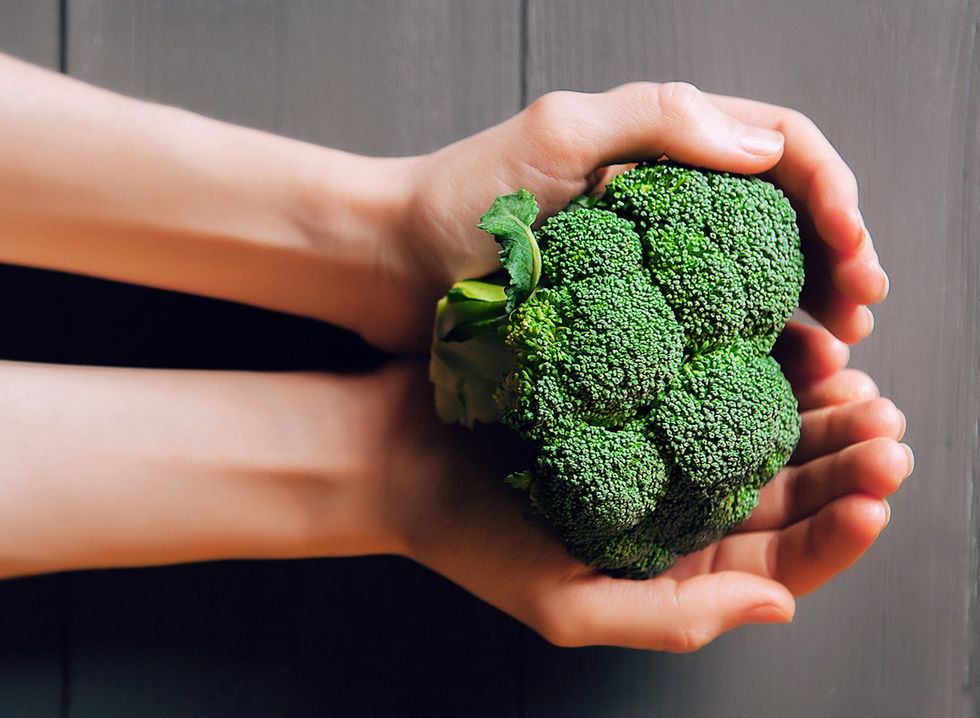 Shutterstock
Shutterstock Shutterstock
Shutterstock 5. Green TeaShutterstock
5. Green TeaShutterstock Shutterstock
Shutterstock Step Five: Stay ConsistentShutterstock
Step Five: Stay ConsistentShutterstock







 Shutterstock
Shutterstock Shutterstock
Shutterstock Shutterstock
Shutterstock Shutterstock
Shutterstock Shutterstock
Shutterstock Shutterstock
Shutterstock Shutterstock
Shutterstock Shutterstock
Shutterstock Shutterstock
Shutterstock Shutterstock
Shutterstock
 Solution #1: Increase Protein IntakeShutterstock
Solution #1: Increase Protein IntakeShutterstock 3. Fatty FishShutterstock
3. Fatty FishShutterstock 3. EggsShutterstock
3. EggsShutterstock 45. Edamame (boiled): 44 caloriesShutterstock
45. Edamame (boiled): 44 caloriesShutterstock Green TeaShutterstock
Green TeaShutterstock AvocadoShutterstock
AvocadoShutterstock BlueberriesShutterstock
BlueberriesShutterstock 29. AlmondsShutterstock
29. AlmondsShutterstock Shutterstock
Shutterstock 7. BroccoliShutterstock
7. BroccoliShutterstock Shutterstock
Shutterstock 8. Oatmeal (5-6g protein per 1/2 cup dry)Shutterstock
8. Oatmeal (5-6g protein per 1/2 cup dry)Shutterstock 23. ChickpeasShutterstock
23. ChickpeasShutterstock 3. Drink More WaterShutterstock
3. Drink More WaterShutterstock

 Jeremy Ethier/YouTube
Jeremy Ethier/YouTube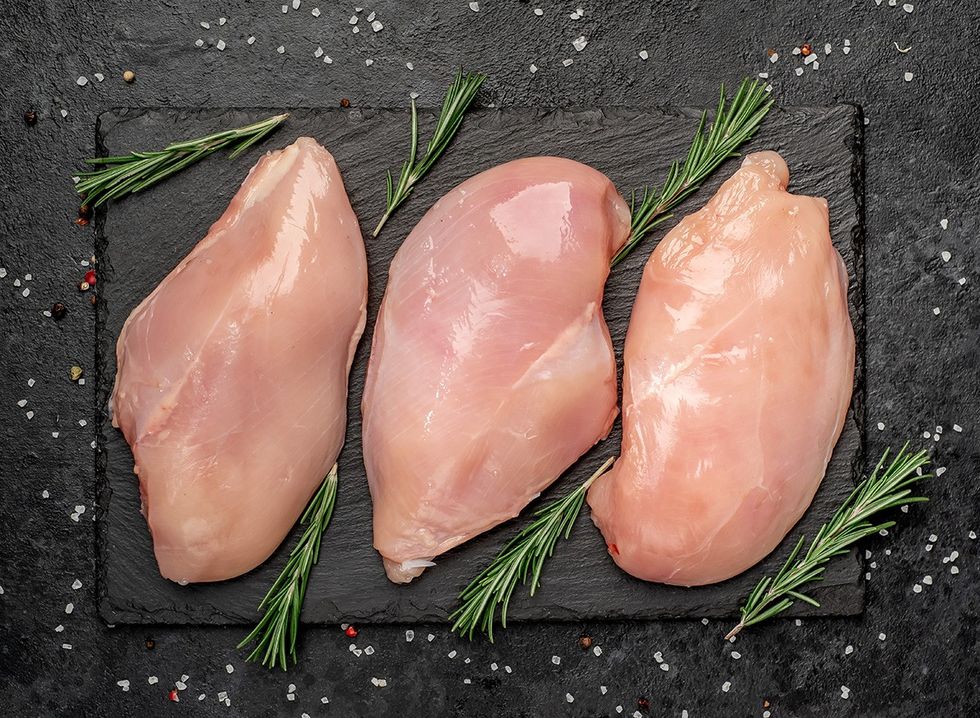 Shutterstock
Shutterstock Shutterstock
Shutterstock
 Jeremy Ethier/YouTube
Jeremy Ethier/YouTube

 I'm a Nutritionist and These 9 High-Protein Snacks Keep My Clients Full While Losing 50 Pounds
I'm a Nutritionist and These 9 High-Protein Snacks Keep My Clients Full While Losing 50 Pounds
 Shutterstock
Shutterstock 2. Processed FoodsShutterstock
2. Processed FoodsShutterstock Shutterstock
Shutterstock Shutterstock/Prostock-studio
Shutterstock/Prostock-studio Shutterstock
Shutterstock Pro TipsShutterstock
Pro TipsShutterstock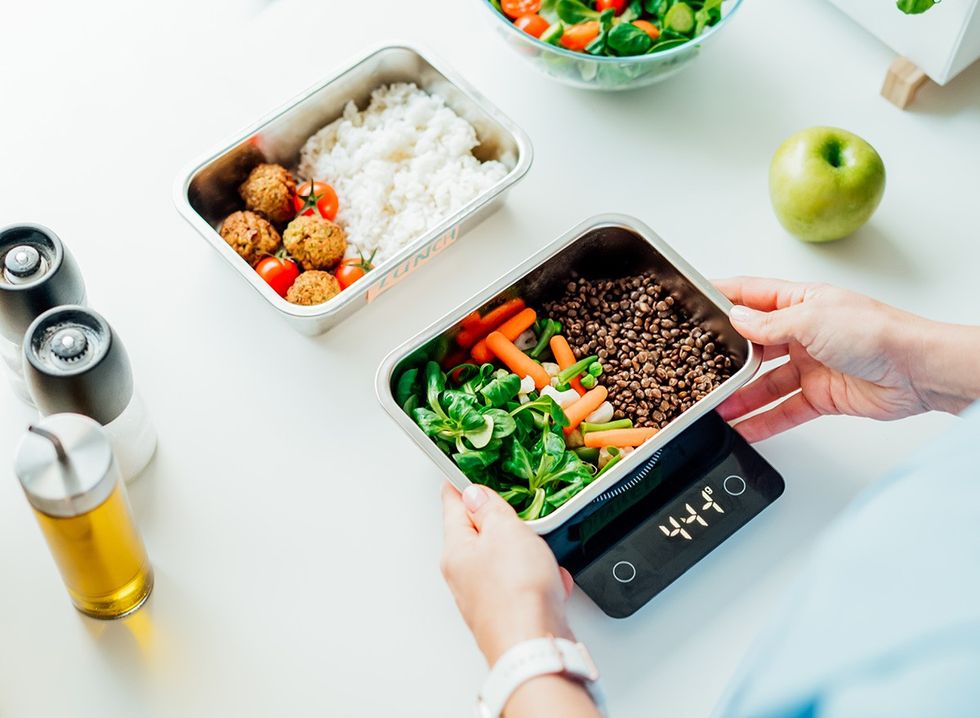 Shutterstock
Shutterstock Shutterstock
Shutterstock Shutterstock
Shutterstock Shutterstock
Shutterstock Don’t Drink as Much AlcoholShutterstock
Don’t Drink as Much AlcoholShutterstock Most Women on GLP-1s Are Making a Few Common MistakesShutterstock
Most Women on GLP-1s Are Making a Few Common MistakesShutterstock Soda and Sugary DrinksShutterstock
Soda and Sugary DrinksShutterstock Shutterstock
Shutterstock Eat BreakfastShutterstock
Eat BreakfastShutterstock And Improve Insulin SensitivityShutterstock
And Improve Insulin SensitivityShutterstock Shutterstock
Shutterstock The Drugs Mimic the GLP-1 Hormone Naturally Produced by the BodyShutterstock
The Drugs Mimic the GLP-1 Hormone Naturally Produced by the BodyShutterstock